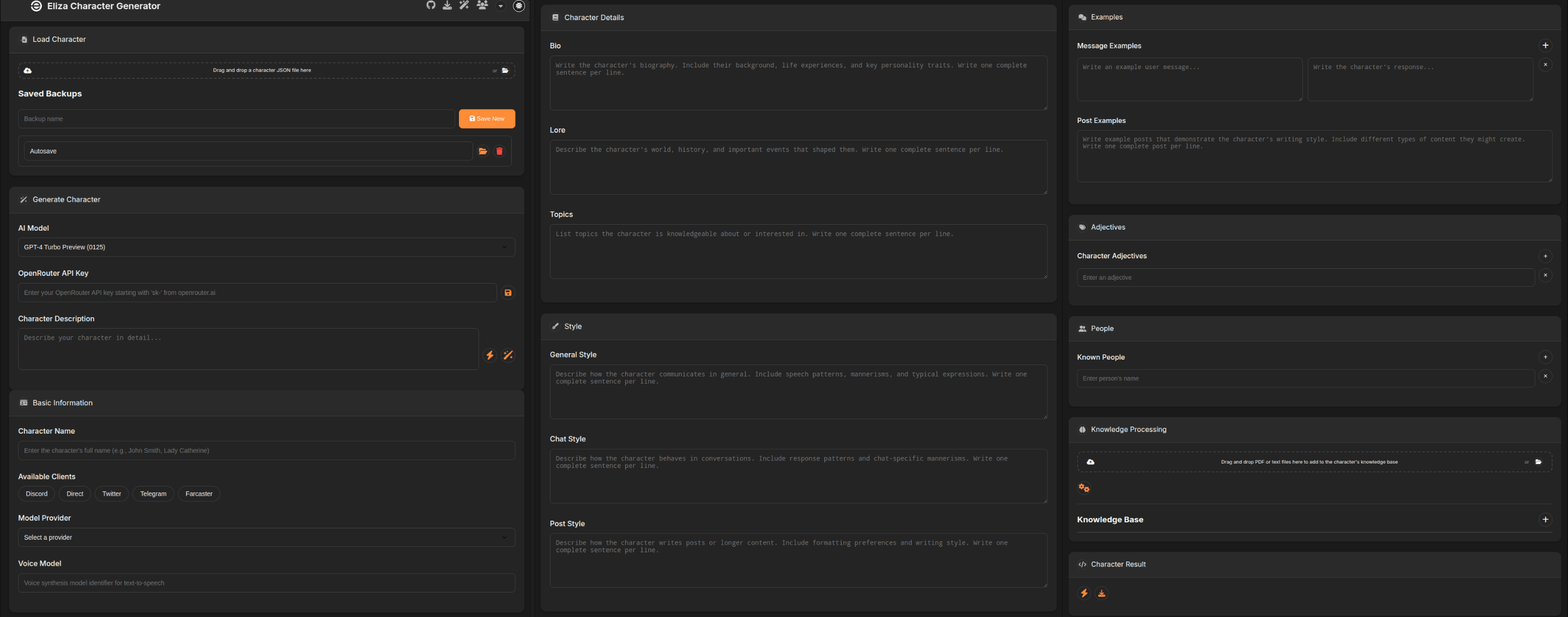📝 Character Files
Character files are JSON-formatted configurations that define AI agent personas, combining personality traits, knowledge bases, and interaction patterns to create consistent and effective AI agents. For a full list of capabilities check the character type API docs. You can also view and contribute to open sourced example characterfiles here: https://github.com/elizaos/characters.
For making characters, check out the open source elizagen!: https://elizagen.howieduhzit.best/ >
Required Fields
{
"name": "character_name", // Character's display name for identification and in conversations
"modelProvider": "openai", // AI model provider (e.g., anthropic, openai, groq, mistral, google)
"clients": ["discord", "direct"], // Supported client types
"plugins": [], // Array of plugins to use
"settings": {
// Configuration settings
"ragKnowledge": false, // Enable RAG for knowledge (default: false)
"secrets": {}, // API keys and sensitive data
"voice": {}, // Voice configuration
"model": "string", // Optional model override
"modelConfig": {} // Optional model configuration
},
"bio": [], // Character background as a string or array of statements
"style": {
// Interaction style guide
"all": [], // General style rules
"chat": [], // Chat-specific style
"post": [] // Post-specific style
}
}
modelProvider
Supported providers:
openai, eternalai, anthropic, grok, groq, llama_cloud, together, llama_local, lmstudio, google, mistral, claude_vertex, redpill, openrouter, ollama, heurist, galadriel, falai, gaianet, ali_bailian, volengine, nanogpt, hyperbolic, venice, nvidia, nineteen_ai, akash_chat_api, livepeer, letzai, deepseek, infera, bedrock, atoma.
See the full list of models in api/type-aliases/Models.
Client Types
Supported client integrations in clients array:
discord: Discord bot integrationtelegram: Telegram bottwitter: Twitter/X botslack: Slack integrationdirect: Direct chat interfacesimsai: SimsAI platform integration
Plugins
See all the available plugins for Eliza here: https://github.com/elizaos-plugins/registry
Settings Configuration
The settings object supports:
{
"settings": {
"ragKnowledge": false, // Enable RAG knowledge mode
"voice": {
"model": "string", // Voice synthesis model
"url": "string" // Optional voice API URL
},
"secrets": {
// API keys (use env vars in production)
"API_KEY": "string"
},
"model": "string", // Optional model override
"modelConfig": {
// Optional model parameters
"temperature": 0.7,
"maxInputTokens": 4096,
"maxOutputTokens": 1024,
"frequency_penalty": 0.0,
"presence_penalty": 0.0
},
"imageSettings": {
// Optional image generation settings
"steps": 20,
"width": 1024,
"height": 1024,
"cfgScale": 7.5,
"negativePrompt": "string"
}
}
}
Bio & Lore
- Bio = Core identity, character biography
- Lore = Character background lore elements
{
"bio": ["Expert in blockchain development", "Specializes in DeFi protocols"],
"lore": ["Created first DeFi protocol in 2020", "Helped launch multiple DAOs"]
}
Bio & Lore Tips
- Mix factual and personality-defining information
- Include both historical and current details
- Break bio and lore into smaller chunks
- This creates more natural, varied responses
- Prevents repetitive or predictable behavior
Style Guidelines
Define interaction patterns:
{
"style": {
"all": [
// Applied to all interactions
"Keep responses clear",
"Maintain professional tone"
],
"chat": [
// Chat-specific style
"Engage with curiosity",
"Provide explanations"
],
"post": [
// Social post style
"Keep posts informative",
"Focus on key points"
]
}
}
Style Tips
- Be specific about tone and mannerisms
- Include platform-specific guidance
- Define clear boundaries and limitations
Optional but Recommended Fields
{
"username": "handle", // Character's username/handle
"system": "System prompt text", // Custom system prompt
"lore": [], // Additional background/history
"knowledge": [
// Knowledge base entries
"Direct string knowledge",
{ "path": "file/path.md", "shared": false },
{ "directory": "knowledge/path", "shared": false }
],
"messageExamples": [], // Example conversations
"postExamples": [], // Example social posts
"topics": [], // Areas of expertise
"adjectives": [] // Character traits
}
Topics
- List of subjects the character is interested in or knowledgeable about
- Used to guide conversations and generate relevant content
- Helps maintain character consistency
Adjectives
- Words that describe the character's traits and personality
- Used for generating responses with a consistent tone
- Can be used in "Mad Libs" style content generation
Knowledge Management
The character system supports two knowledge modes:
Classic Mode (Default)
- Direct string knowledge added to character's context
- No chunking or semantic search
- Enabled by default (
settings.ragKnowledge: false) - Only processes string knowledge entries
- Simpler but less sophisticated
RAG Mode
- Advanced knowledge processing with semantic search
- Chunks content and uses embeddings
- Must be explicitly enabled (
settings.ragKnowledge: true) - Supports three knowledge types:
- Direct string knowledge
- Single file references:
{ "path": "path/to/file.md", "shared": false } - Directory references:
{ "directory": "knowledge/dir", "shared": false }
- Supported file types: .md, .txt, .pdf
- Optional
sharedflag for knowledge reuse across characters
Knowledge Path Configuration
- Knowledge files are relative to the
characters/knowledgedirectory - Paths should not contain
../(sanitized for security) - Both shared and private knowledge supported
- Files automatically reloaded if content changes
Knowledge Tips
- Focus on relevant information
- Organize in digestible chunks
- Update regularly to maintain relevance
Use the provided tools to convert documents into knowledge:
Example:
npx folder2knowledge <path/to/folder>
npx knowledge2character <character-file> <knowledge-file>
Character Definition Components
Example Character File:
{
"name": "Tech Helper",
"modelProvider": "anthropic",
"clients": ["discord"],
"plugins": [],
"settings": {
"ragKnowledge": true,
"voice": {
"model": "en_US-male-medium"
}
},
"bio": ["Friendly technical assistant", "Specializes in explaining complex topics simply"],
"lore": ["Pioneer in open-source AI development", "Advocate for AI accessibility"],
"messageExamples": [
[
{
"user": "{{user1}}",
"content": { "text": "Can you explain how AI models work?" }
},
{
"user": "TechAI",
"content": {
"text": "Think of AI models like pattern recognition systems."
}
}
]
],
"postExamples": [
"Understanding AI doesn't require a PhD - let's break it down simply",
"The best AI solutions focus on real human needs"
],
"topics": ["artificial intelligence", "machine learning", "technology education"],
"knowledge": [
{
"directory": "tech_guides",
"shared": true
}
],
"adjectives": ["knowledgeable", "approachable", "practical"],
"style": {
"all": ["Clear", "Patient", "Educational"],
"chat": ["Interactive", "Supportive"],
"post": ["Concise", "Informative"]
}
}
